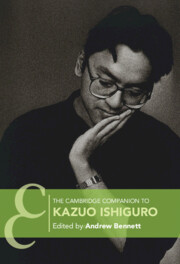Book contents
- The Cambridge Companion to Kazuo Ishiguro
- The Cambridge Companion to Kazuo Ishiguro
- Copyright page
- Contents
- Figures
- Contributors
- Acknowledgements
- Chronology
- Abbreviations
- Introduction
- Part I Kazuo Ishiguro in the World
- 1 Ishiguro and the Question of England
- 2 Ishiguro and Japan
- 3 Ishiguro and Colonialism
- 4 Immigration and Emigration in Ishiguro
- 5 Ishiguro and Translation
- Part II Literature, Music, and Film
- Part III Ethics, Affect, Agency, and Memory
- Guide to Further Reading
- Index
- Cambridge Companions To …
5 - Ishiguro and Translation
from Part I - Kazuo Ishiguro in the World
Published online by Cambridge University Press: 16 March 2023
- The Cambridge Companion to Kazuo Ishiguro
- The Cambridge Companion to Kazuo Ishiguro
- Copyright page
- Contents
- Figures
- Contributors
- Acknowledgements
- Chronology
- Abbreviations
- Introduction
- Part I Kazuo Ishiguro in the World
- 1 Ishiguro and the Question of England
- 2 Ishiguro and Japan
- 3 Ishiguro and Colonialism
- 4 Immigration and Emigration in Ishiguro
- 5 Ishiguro and Translation
- Part II Literature, Music, and Film
- Part III Ethics, Affect, Agency, and Memory
- Guide to Further Reading
- Index
- Cambridge Companions To …
Summary
This chapter highlights translation as both formally and thematically at the very core of Kazuo Ishiguro’s writing – as its origin, strategy, and target. Its first part considers the ways in which the author’s engagement with the two cultures at the heart of his own experience helped shape a translational realism and a poetics of originary translatedness that are central to his style and that comment implicitly on their own constructedness as well as on our narrative and critical assumptions. The chapter then turns to a focus on Ishiguro’s self-consciously ‘translated’ narrative voices training us in navigating their liminalities, thus prompting reflection, on various levels, on the limits of knowing. Ultimately, the chapter argues that Ishiguro’s poetics of translation – or more precisely the liminalities of its subtly self-reflexive translational realism and voice – draws attention to itself as such, thereby extending the novels’ concerns to an ethics of reading that also models an ethics for reading world literature.
Keywords
- Type
- Chapter
- Information
- The Cambridge Companion to Kazuo Ishiguro , pp. 74 - 88Publisher: Cambridge University PressPrint publication year: 2023

